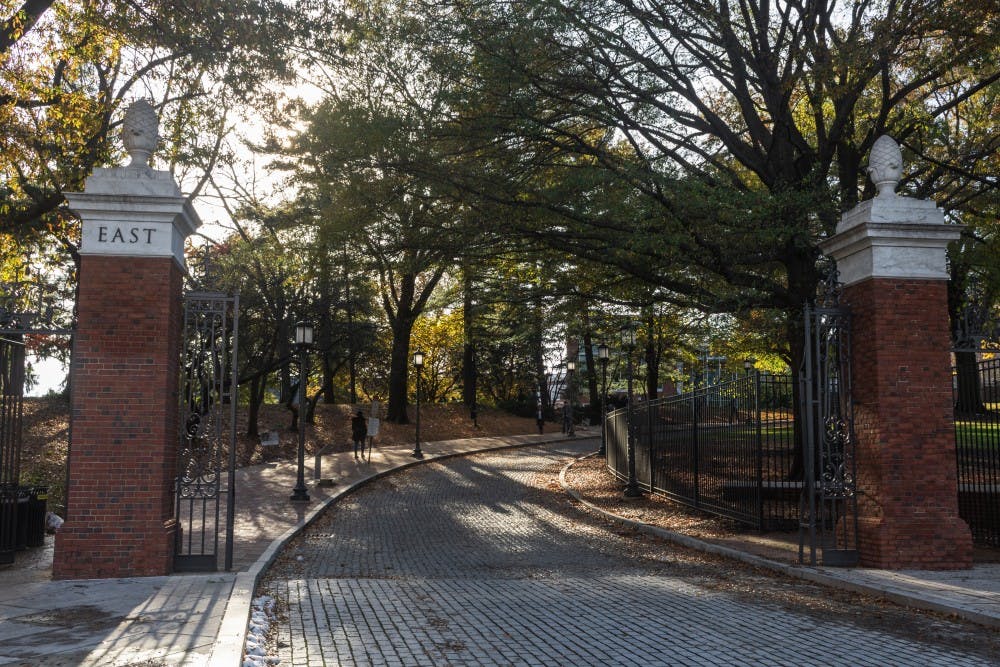The Portuguese Program’s Fall 2019 Speaker Series hosted its first lecture, “Professor AJR Russell-Wood and the Study of History,” on Monday in Hodson Hall. Dr. Franklin Knight, who taught at the University for more than 45 years, gave a talk about the life and work of his colleague, AJR Russell-Wood.
Russell-Wood played a major role in the founding of the Program in Latin American Studies (PLAS) at Hopkins. He taught at the University from 1971 until his death in 2010.
Knight explained that examining Russell-Wood’s contributions to the University to start the lecture series made logical sense.
“The reason why we have put [this lecture] around A.J.R. Russell-Wood was that, in large measure, A.J.R. Russell-Wood was the basis on which Latin American Studies was established, and he was one of the world’s leading scholars on Brazil and the Portuguese world,” Knight said.
Russell-Wood was born in Wales in 1940. When he was 11, he left to board at the Rossall School in Lancashire, England. He then got a diploma in Portuguese Studies from the University of Coimbra in Portugal in 1960 and attended Oxford University for his bachelor’s and master’s degrees, as well as his PhD.
At Oxford his mentors Charles Boxer, Sir Peter Russell and Hugh Trevor-Roper encouraged him to pursue his research with a global perspective. From these men he gained the life-long conviction that good writing was based on thorough research. As Knight described on one of his slides, Russell-Wood felt a strong draw to Portuguese history and, by extension, Latin American history.
“What constantly fascinated Russell-Wood was how such a relatively small population of Iberian Portuguese inventively came to grips with bewildering changes over time, as well as challenging circumstances across an extensive global geography,“ Knight wrote.
Knight explained that this global geography involved multiple peoples, unfamiliar languages, complex cultures and unimaginable new flora and fauna.
According to Knight, Latin American studies is a relatively new field of study in America. Knight explained that it was not until the Mexican and Cuban Revolutions of the 20th century that foreign policy academics started to turn their focus towards Latin America. As the Cold War became more prevalent, so did the need for America to understand potential Latin American allies.
In the late 1960s, Hopkins invited three professors to teach Latin American studies, two of whom were Knight and Russell-Wood.
“The only one of the three who accepted the invitation was John Russell-Wood, and it took Jack Green [of the history department] two years to find him... Jack would come to me and say, ‘You know, we haven’t been able to find John Russell-Wood, but we think he might be in Macau.’ We tried Macau, and they said he had moved on to Hong Kong. We tried Hong Kong, and they said, ‘Oh no no! He’s back in London,’” Knight said. “And so it kept going on.”
Russell-Wood joined the Hopkins faculty in 1971, and two years later a far more reluctant Knight followed. It was a time of great transition for the University, as the first female undergraduate students were admitted.
“The University was undergoing this big change, and Russell-Wood, in creating this opening to Latin America and revitalizing Brazilian studies, was part and parcel of that,” he said.
Although the PLAS would not be created for another two decades, in these years Russell-Wood laid important groundwork for a new field of study at Hopkins. He taught a variety of courses to both graduate and undergraduate students, exploring topics like colonial Latin America, Portugal and the wider world, the Age of Discovery and the African diaspora.
Russell-Wood was also a prolific writer over the course of his career, publishing 10 monographs, 68 scholarly articles and 50 scholarly reviews.
His first book, Fidalgos and Philanthropists, was published in 1968.
Knight described the book as bold and ambitious and similarly complimented Russell-Wood’s later works, such as 1982’s The Black Man in Slavery and Freedom in Colonial Brazil and 1992’s A World on the Move.
Knight explained that Russell-Wood went on to receive extensive recognition for his work, including honors from the City of Baltimore, the State of Maryland, Portugal, Brazil, Great Britain and the European Community.
“He was a world-famous historian,” Knight said.
Director of the Portuguese Language Program Flavia De Azeredo-Cerqueira said after the talk that she felt it was very informative.
“It was really insightful and gave the students a net understanding of Dr. Russell-Wood and his legacy and publications,” she said.
Azerdo-Cerqueira explained that, with the upcoming 10th anniversary of Russell-Wood’s death next year, it was a good time to recognize his contributions to the field of Latin American studies.





